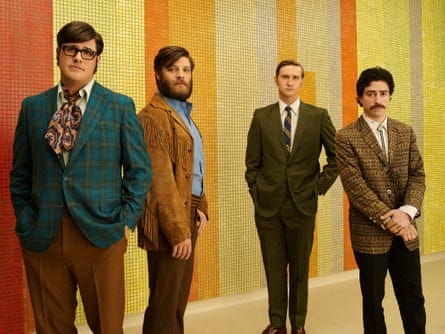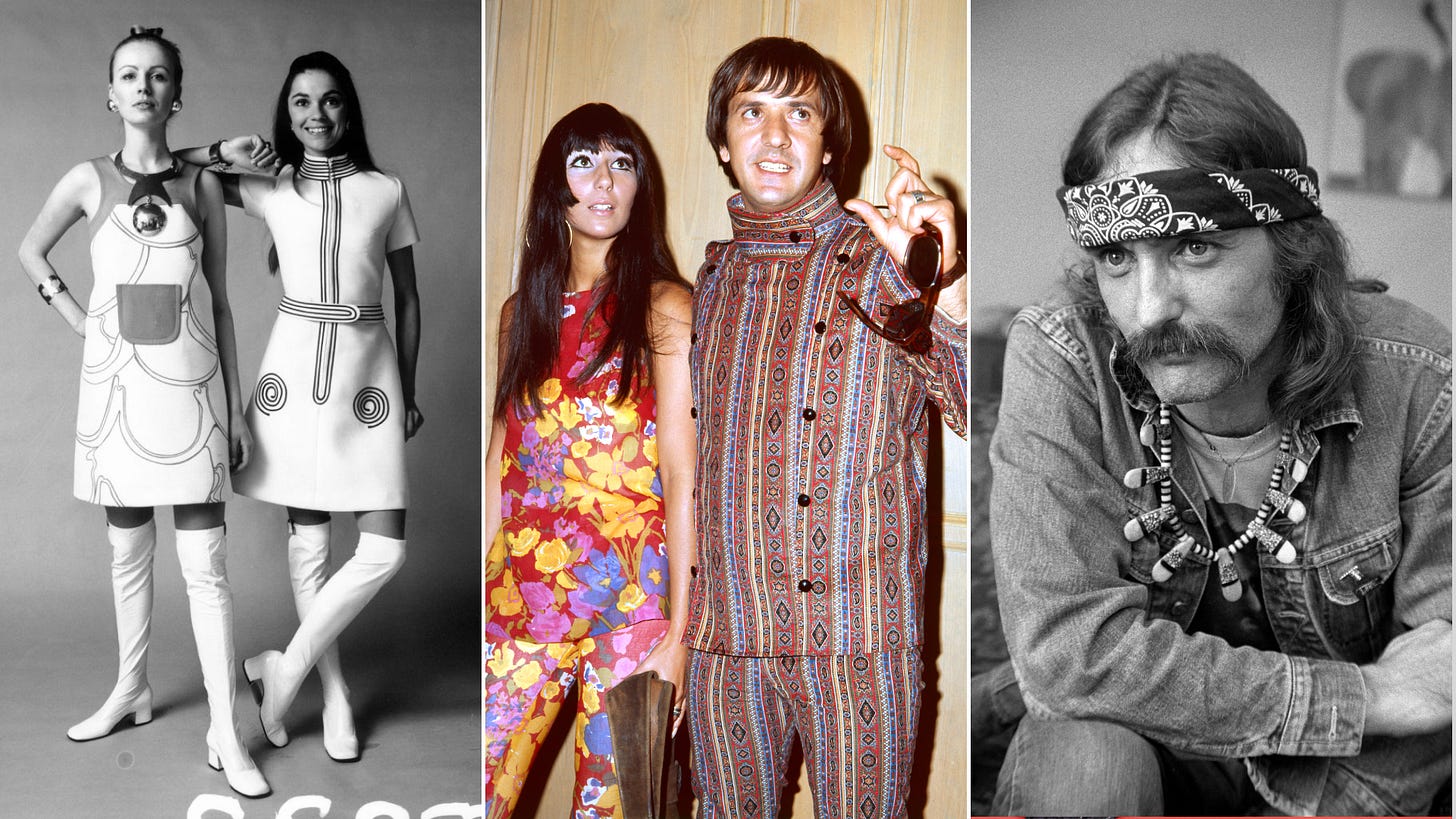Xenocentrism, Narcissistic Identification, and the American Dystopia
The Cozy Catastrophe Club Reads Tom Wolfe and Watches Crocodile Dundee
Recently I made a post describing how there are some really huge important things about the US that are much better than Europe, and
recommended the book Hooking Up by Tom Wolfe. I’ve heard of Tom Wolfe before and this fact reminded me that he was the one who coined “The Me Decade” to refer to the 1970s, which was broadened into “The Me Generation” to describe the Baby Boomers. Stephanie Molchan was the person who got me onto Substack to begin with and one of the reasons was because I was complaining about Baby Boomers. Tom Wolfe probably has a lot to do with most complaints about Baby Boomers.Narcissism is more or less exactly the problem I’ve been seeing with our culture in my opinion. I think America is being basically ruined by narcissism and I have talked about leaving off and on even on Substack. I didn’t mention that at all until I sent an email to my pastor at church saying I wanted to probably move to New Zealand followed by some other places and then she told everyone that was where I wanted to move and that someone else from the Methodist church was living there for a year every time it was brought up. Then I decided I didn’t have to keep that a total secret anymore. The thing is even though I don’t feel like I hate America I still think it is super dysfunctional and me staying here won’t fix it. I don’t want to burn any bridges but the only reason I didn’t leave years ago is I decided Europe wasn’t a magical utopia after all, and the Europeans and others seemed to desperately be trying to make sure you had to dedicate your life to living in Europe to replace their aging population or you couldn’t go, rather than just being able to take a trip there. Later when I found there are a lot of places in Asia, Oceania, and even Latin America that seem more functional than the US is right now I want to move again, but not out of hatred for America even though I do think now is a great time to leave since the US seems to be in shambles and I don’t want to be around for that, and me staying isn’t going to fix anything because there’s basically no way to assist the economy from within the territory in my opinion since it’s largely collapsing from a lack of trade among other things.
Though psychoanalysis is no longer in vogue and I don’t think I could get a psychoanalysis job in America since it’s only taught in specialized psychoanalysis academies that have no academic prestige, one of the things I think of is the idea of narcissistic identification. In early psychoanalysis, narcissistic identification referred to the idea of the patient identifying with the analyst, however, I’ve come to think of the term in terms of how narcissistic people always want to identify themselves with someone else.
Identification (psychology) - Wikipedia
Primary identification
[edit]
Primary identification is the original and primitive form of emotional attachment to something or someone prior to any relations with other persons or objects:[6] "an individual's first and most important identification, his identification with the father in his own personal prehistory...with the parents".[7] This means that when a baby is born he is not capable of making a distinction between himself and important others. The baby has an emotional attachment with his parents and experiences his parents as a part of himself. "The breast is part of me, I am the breast."
During this process of identification children adopt unconsciously the characteristics of their parents and begin to associate themselves with and copy the behavior of their parents. Freud remarked that identification should be distinguished from imitation, which is a voluntary and conscious act. Because of this process of emotional attachment a child will develop a super ego that has similarities to the moral values and guidelines by which the parents live their lives. By this process children become a great deal like their parents and this facilitates learning to live in the world and culture to which they are born.[8]
"By and large, psychoanalysts grant the importance and centrality of primary identification, even though...the concept varies 'according to each author and his ideas, its meaning in consequence being far from precise' (Etchegoyen 1985)".[9]
Narcissistic (secondary) identification
[edit]
Narcissistic identification is the form of identification following abandonment or loss of an object. This experience of loss starts at a very young age.[6] In "Mourning and Melancholia" Freud, having "shown that identification is a preliminary stage of object-choice", argued that the experience of loss sets in motion a regressive process that "served to establish an identification of the ego with the abandoned object".[10] In "The Ego and the Id", he went on to maintain that "this kind of substitution has a great share in determining the form taken by the ego and that it makes an essential contribution towards building up what is called its 'character'".[11]
Jacques Lacan, in his theory of the Imaginary, developed the latter point, describing the ego as being "constituted in its nucleus by a series of alienating identifications"[12] – part of his opposition to any concept of an "autonomous" and conflict-free ego.
I don’t think Freud or Lacan are the end-all be-all personally, there’s also Jung as well as Adler and others, though Jung has probably proven to be the best of the psychoanalysts despite what I see as shortcomings with him.
I see the great conflict with the US as being that Americans (as in US citizens and not people from the continents of the Americas) are largely taught to see themselves as European, but they’re clearly not. This can also be described as xenocentrism. I think this xenocentrism is absolutely terrible and destroying the US. It’s really quite a deep issue though because Americans actually identify themselves with Europe, rather than merely seeing Europe as something aspirational. I think Europe is not very aspirational in general even though I don’t want to accidentally exaggeratedly make it sound like I think Europe is absolutely no good and nothing worthwhile has ever come out of Europe.
However, America is basically a blissful society of the future compared to Europe and these broad identifications with Europe are largely messing that up, and people can’t even see them because they’re identifications with Europe, not merely admirations of Europe. They don’t see themselves as something distinct from Europe, just as failed Europeans, even when they are concretely outperforming Europe in basically any way that matters. There are even more museums in the US than Europe, never mind the quality of the beaches, food, and the like. Healthcare might be free in Europe but I don’t know how much that can matter when people are living in abysmal conditions stacked on top of each other with little freedom of movement and things like food, water, and even public toilets are astronomically expensive. There are places that are universally cheaper than the US but those are in Asia, Oceania, and Latin America, not Europe, which seems to mostly just trade some expenses for others if you want to live at the same standard of living as in the US, and I wouldn’t personally recommend living in for example the People’s Republic of China even if the cost of living is a lot lower anyway.
Xenocentrism is the preference for the cultural practices of other cultures and societies, such as how they live and what they eat, rather than of one's own social way of life.[1] One example is the romanticization of the noble savage in the 18th-century primitivism movement in European art, philosophy and ethnography.[2] Xenocentrism can be a type of ethnocentrism. Because ethnocentrism is often negative and characterized by perceived superiority of one's own society to others, it often contrasts with xenocentrism.[3][4]
Etymology
[edit]
The term xenocentrism was coined by American sociologists Donald P. Kent and Robert G. Burnight in the 1952 paper "Group Centrism in Complex Societies" published in the American Journal of Sociology.[4][5] Kent and Burnight state that feelings of xenocentrism are caused by three possible factors; individuals who have familial ties to a foreign country, specifically 2nd or 3rd generation immigrants, those who oppose the political choices of their native country. One example of this is the Communist Party USA. The party idealized the Soviet Union and its anti-capitalist government. As well as individuals who are exposed to other cultures and grow disenchanted with their society, and then rebel against it.[4] This word remained obscure but considered useful and occasionally used by other sociologists.[5] The University of Florida treats it as a key term of Sociology.[6]
The term is opposed to ethnocentrism, as coined by 19th-century American sociologist William Graham Sumner, which describes the natural tendencies of an individual to place disproportionate worth upon the values and beliefs of one's own culture relative to others.[4]
Examples
[edit]
Consumer xenocentrism
[edit]
Rene Dentiste Mueller and Amanda Broderick[7] were the first to apply the consumer xenocentrism (CX) concept to describe the preference that some consumers have for foreign goods, even when domestic goods are qualitatively and/or functionally similar or better. Although the CX phenomenon is global, the researchers cite a significant number of studies that suggests there are proportionally more consumer xenocentrics in former colonies where the locals have been conditioned to perceive ‘foreign’ as better. A consequence of consumer xenocentrism is its negative effect on local industry and on the decline in living standards as poor consumers buy the (often) more expensive foreign products. Consumer xenocentrism, especially among the local elites, reduces confidence and pride in local manufacturing which can lead to the loss of local industries, a decline in purchase choices, especially among traditional products or even a dependency on foreign ones. Mueller, Wang, Liu and Cui,[8] applied the concept to China and showed consumer xenocentrism is not a new phenomenon. The researchers were also able to show that when consumer xenocentrism grew too much, a ‘protection of the herd’ mentality caused the pendulum to swing back towards consumer ethnocentrism (nationalism).
Xenocentrism in this context is essentially “the colony mentality.” I think it is a terrible way of looking at the world and basically a slave mentality. However, you never hear so-called postcolonialists say that maybe for example the US and Canada should stop thinking of themselves as British (or any other kind of European in the case of the US.) People seem to want to think that white people can’t be colonized because that protects their ego from having to admit that they’re actually the colonized and not the colonizer. Why did the US even fight in wars like World War One (which had no evil Nazis in Germany) or the Vietnam War anyway? Because Americans identified with European colonial interests even when it clearly made their lives tangibly worse. At least WWII was kind of punishment for Europe since it destroyed Europe’s manufacturing centers even if that doesn’t remotely justify events like the Holocaust, so that at least kind of made it clear who has the real agency even though Americans continued to identify with the colony slave mentality and got pulled into Vietnam anyway. Also notice that all the Elon Musks and Peter Thiels, basically the PayPal Mafia headquarters all their companies in London and Elon is applying for UK citizenship. The leaders see themselves as British and basically see Americans as like their loyal stupid dogs or something, and it’s really Americans’ faults for not just being the metaphorical shrugging Atlas since the Old World people couldn’t even do anything without us, though at least now Trump is shrugging off Europe and that’s great in my opinion even if it’s not happening fast enough.
The U.S. has more in common with South America than Europe | The Week
If you move in upper middle class circles, you know the conversation: A friend or relative comes back from sojourn in Europe with endless critiques of American life. The food in Italy, the trains in Germany, the architecture in Czechia — everything American pales in comparison.
Some of these comparisons are merely annoying, like the enthusiasm for soccer that's become a paradoxical mark of cultural sophistication (in Europe, soccer is traditionally a working-class game). But deference to European models also has a distorting influence on U.S. politics. On the left, admiration of Scandinavian countries funds pursuit of higher minimum wages and more generous social benefits. On the right, Hungary and Poland serve as models of family policy and immigration restriction. Why can't we be more like our peers?
Perhaps the better question is: Why do we think these countries are our peers?
When people are trained to identify themselves as something they aren’t, for example, European, I think that tends to carry over into total shock and alienation when seeing oneself as “the Other.” I think this is behind the popularity of works of fiction such as Harry Potter, X-Men, and the original, John Wyndham’s books. At a point it can become comforting to see yourself as “the Other,” but John Wyndham wasn’t comforted by that because he was British so he never wrote a sequel to the Chrysalids and didn’t even finish the sequel to the Midwich Cuckoos, even though David Bowie made his personas around how he imagined he was an alien and all that.
Sauron-wannabe Peter Thiel keeps saying that he imagines the Antichrist will come and scare everyone with the Apocalypse all the time, but when people ask him if that’s what he’s doing he talks in his Peter Thiel way like “umm umm umm of course not.” I think he misses the real solution to the problem which is people must identify with what they’ve been trained to see as “the Other.” When that happens it is like the apocalypse, but they survive because the world that ended was fake anyway. That’s why the word apocalypse just means revelation and the Bible books Apocalypse and Revelations are literally different translations of the same word referring to the same book. The world is fundamentally a perceptual phenomenon, and the end of the world is basically equivalent to a change in personal identity. People might argue if the planet blew up that would be the end of the world, but even the planet is not the world because when the world ends the planet is still usually there and when planets get blown up like in Star Wars that doesn’t usually mean the end of the world in an apocalyptic sense. The apocalypse is basically just proof that one thing actually definitely is a social construct and that’s society itself.
The biggest criticism of the US is essentially that it’s become the very kind of society it sought to criticize and I think that’s accurate, but the real issue is that’s been a problem since at least Tom Wolfe called the 70s the Me Decade. I think the narcissism involved a lot of identification with Europe which was destructive, and narcissism always means identifying with not-yourself. Since many people want to move to Australia and I was doing research, something else that comes to mind is the silly dated Crocodile Dundee movie series. Even if they do seem silly and dated, I think they have survived way too well compared to how anyone thought they would and that’s because they seem to be the only media lampooning the aspect of American culture that’s existed since at least the 1920s with for example the Great Gatsby (and is incidentally when the Great Depression happened to begin with as a result of the Roaring 20s and got us WWII because of the Treaty of Versailles in Weimar, Germany, so this is probably not a coincidence,) but grew increasingly prominent, which is the social climber aspect. That seems to be fundamentally what the movie is about, where the female lead leaves her relationship with the 1980s finance bro to go live in the Australian outback, because it’s poking fun at the xenocentric idea of America as supposedly being the Wild West when even in the 1980s the European social climbing stuff was taking over and Australia was more like the real Wild West. So the identities get shifted in a way that people don’t see because of how they’re used to egotistically seeing themselves and their own psychology. At least in the 1950s and even the 1960s there was a sense of social solidarity, but in the 1970s that seemed to have more or less totally broken down, and then the 1980s was a reaction against that.
That’s also why people fawn over the 60s and the 80s but not the 70s. No one wants to go back to the 70s. However, that probably means the 60s and 80s were more alike than anyone thought and the idea that they’re opposite is just fake. The 60s were a time of social solidarity and so were the 80s, the 70s is just when people became completely self-absorbed and also created the ugliest and creepiest aesthetics to go with it in terms of their fashion sense and interior design. The 70s just looked totally hideous for the most part and I can’t believe anyone would ever make that except for the fact they clearly did, they were clearly just narcissistically sniffing their own farts or something if they thought that looked good in any way. Meanwhile media like Stranger Things makes people want to go back to a 1980s aesthetic, and some people cover their cars and clothes with Grateful Dead stickers and patches like it’s the 1960s, but no one wants to go back to the 70s. People freaked out when Donald Trump had anything to say about Jimmy Carter but I think they were just on the right page together: the 80s incarnate praised the 60s incarnate and all was right in the world for a brief moment. Warning: You shall now have to look at how hideous the 70s were.
Eww gross.
This is a test of your gag reflex. If you are gagging right now you know you’re not in a total state of unhealth.
Did you barf on this? No? I guess it looks like barf either way.
A popular 1970s hobby was rioting in the streets, complete with actual literal dumpster fires, because the 1970s were a dumpster fire.
In fact, everything was such a wreck the rioting basically made no difference to begin with.
People also enjoyed the hobby of shooting at presidents and trying to kill them much like they did with Trump during the 2020s, which is probably why Trump and Carter could get along aside from their mutual enmity with the 1970s.
Democratic Presidents were not alone in being shooting targets during the 1970s! Multiple Republican Presidents were also shot at!
So, umm, eww, the 1970s. Don’t be a narcissist like the Baby Boomers. It’s clear this is a bipartisan issue as well. Make America American Again, by not identifying with Europe, even though this will really tick the Europeans off since they will lose “their” military and economy which is already happening and already ticking them off.
I think a notable example of xenocentrism in marketing is Palantir.














fascinating analysis as usual. I have objections to several of your generalizations. However, the overall message is spot on.
we know from the Bible that even the least influential person can make a huge difference in the world. your skill at writing can awaken the apathetic to regard seriously these big issues. you can have an impact, even if it is not the one that you pictured. A life well lived is inspiring. An intellect well developed matters. You matter.
A large amount of what is wrong with America is the money game. Money has been a trade article for millennia, but has also been used for a form of bondage as well. The wealthy have the ability to hold resources out of reach and then ask you to pay them, to have access. At a grand scale, this controls food, housing and healthcare as basic needs. What we all do, is get consumed by the need for money and that, in the ends, requires us to be identifiable as "useful" or "needed" or even just present. Money has become the be all, end all solution to all problems, because most of us are consumed with the task of getting more money and having enough money to accomplish something due to someone else "owning" a resource that we have to square, from that someone. This is, of course, how consumerism is positioning us to participate by playing the money game.
There are enough people so wound up in the game, that they are not focused on what game they are playing, and escape vector they can control, or even how silly they are acting in their participation in the game. Because they've spent time, money or even thoughts on various details, they're invested, and will do anything to justify that, because they don't want to appear to "fail" at something. This is where all of this narcissism is driving people to go. They cannot accept that they don't know everything.
The Dunning/Kruger effect is the visible sign of people supposing they have enough information to believe they are right, but not near enough information to understand that they are wrong. This again is a problem with them accepting "failure" or "ignorance" as a natural event of learning.